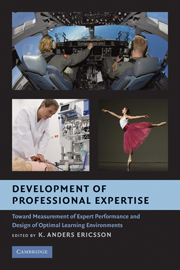 Development of Professional Expertise
Development of Professional Expertise Published online by Cambridge University Press: 04 August 2010
In many domains, the real world is modeled with systems of equations. Such a model uses variables to represent domain properties and equations to represent applications of domain principles. Given a set of true domain relationships expressed as equations, one can deduce new equations from them using only the rules of mathematics, and the new equations will also be true domain relationships. The latter step, wherein mathematical implications are derived from the initial model, can often be done mechanically, for example, by mathematical symbol manipulation programs, spreadsheets, calculators, etc.
Given a real-world situation that is amenable to such analysis, experts and novices understand them quite differently. Whereas novices must go through the whole modeling process by writing equations on paper and solving them, experts can generate many conclusions about the same situations without having to commit anything to paper. For the expert, many domain relationships are just “obvious” or can be easily inferred “by inspection.”
There are limits to the experts' abilities. Although experts usually cannot mentally infer quantitative relationships, such as the exact numerical value for an energy or a velocity, they can infer qualitative relationships, such as whether a quantity is zero, increasing or greater than some other quantity. Thus, it is often said that expertise in such domains is characterized by a conceptual or qualitative understanding of real world situations (VanLehn, 1996). It is sometimes said that they have developed domain-specific intuitions (Simon & Simon, 1978).
To save this book to your Kindle, first ensure [email protected] is added to your Approved Personal Document E-mail List under your Personal Document Settings on the Manage Your Content and Devices page of your Amazon account. Then enter the ‘name’ part of your Kindle email address below. Find out more about saving to your Kindle.
Note you can select to save to either the @free.kindle.com or @kindle.com variations. ‘@free.kindle.com’ emails are free but can only be saved to your device when it is connected to wi-fi. ‘@kindle.com’ emails can be delivered even when you are not connected to wi-fi, but note that service fees apply.
Find out more about the Kindle Personal Document Service.
To save content items to your account, please confirm that you agree to abide by our usage policies. If this is the first time you use this feature, you will be asked to authorise Cambridge Core to connect with your account. Find out more about saving content to Dropbox.
To save content items to your account, please confirm that you agree to abide by our usage policies. If this is the first time you use this feature, you will be asked to authorise Cambridge Core to connect with your account. Find out more about saving content to Google Drive.